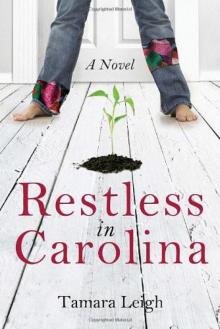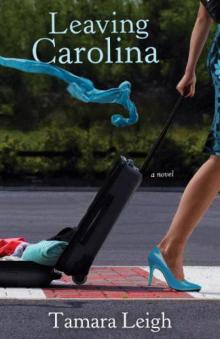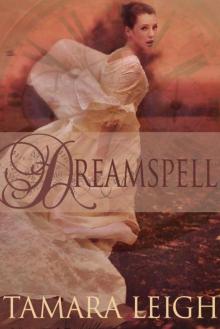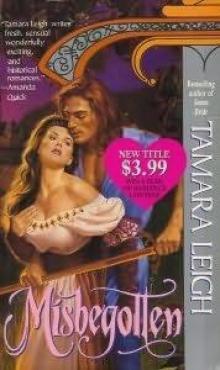- Home
- Tamara Leigh
The Redeeming: Book Three (Age of Faith) Page 11
The Redeeming: Book Three (Age of Faith) Read online
Page 11
It was useless to try to sleep as Garr had encouraged her to do, for there was no rest to be found behind her lids—only deepening anger, resentment, and frustration. When the knock sounded on her chamber door two hours later, she felt as coiled as a snake.
She swung her feet to the floor and stood from the bed. “Enter!”
Garr stepped inside. “You are rested?”
She glanced past him to Everard, then Abel who eased the door closed. “As best as I was able to.”
He considered her face and, from his troubled brow, did not like what he saw there. “Ere we proceed with this marriage, there are things that must needs be addressed.”
“My virtue.”
He blinked. “Aye, but first I would know what you want—that which is within your grasp and my ability to deliver.”
She had not expected to be asked such. “You are saying you will give me what I want?”
“I shall try.”
“Even if it bodes ill for the Wulfriths?”
“Whatever is within my power—”
“Does your power extend to promises made that would have to be broken to give me what I ask?”
He drew a deep breath. “Gaenor, ‘tis possible I might yet find a way to release you from this betrothal, even though I believe it will be a good marriage and—I will not lie—of benefit to our family.”
She clasped her hands hard. “But then your word would be made a lie, and that is not permissible for a Wulfrith.” She looked to her other brothers. “Is it?”
Garr laid a hand on her shoulder. “Of what do you speak?”
“I speak of the bargain struck with my betrothed—that, in exchange for testimony to prove Beatrix’s innocence, you would hand me over.”
Garr’s mouth turned grim. “Sir Durand told you.”
“He did.”
“And for this you fled Stern Castle.”
“I did.”
Another deep breath. “I can only say it was what was required at the moment, and I believed you would agree to it to save Beatrix.”
Moisture collected in Gaenor’s eyes. “I would have, but why did you not tell me?”
Abel stepped forward. “For fear it would reflect poorly on your betrothed.”
“It does,” she exclaimed, “for what kind of man forces such a bargain? Threatens the fate of another for his own gain? The fate of the sister of the woman he is to wed?”
“A man weary of the hostilities between his family and ours,” Garr said. “A man who wishes peace, unlike his father or brothers. Believe me, Gaenor, had Christian Lavonne shown himself to be like those of his blood, I would risk heaven’s wrath to keep you from him. I would find a way.”
She searched his eyes and saw he spoke true.
“And do not forget, Gaenor, ‘twas Baron Lavonne who threw the dagger that saved Beatrix from his brother.”
“I do not forget, and I am grateful, but I know the baron cares not for his illegitimate brother who is a thorn in his side. Thus, mayhap ‘twas done for his own gain, not Beatrix’s.”
“Had he killed him, perhaps, but he did not.”
“And more the pity,” Abel grumbled.
Gaenor looked to her youngest brother, but before she could question him, Garr pressed on. “Tell me what you want.”
Though niggled by Abel’s remark, she said, “No different from what Beatrix wants: a good husband, children, happiness. Can you give me that?”
“I believe Baron Lavonne can—that he will prove such a husband to you and father to your children.”
A man of deceit. But Garr did not know what had happened between her and Christian Lavonne at Wulfen. And she would not tell him, though she longed to ask the reason she had not been told that the baron had trained with her brothers at Wulfen. Of course, one did not have to be sharp of wit to guess the reason Christian Lavonne had sought training. Having been raised for the Church, his skill at weaponry was surely neglected, and there was no better place to learn how to wield a blade well than at Wulfen.
“Though ‘tis a difficult thing I must ask,” Garr said, “it must be known ere we proceed further. If Baron Lavonne takes you to wife, will it be a maiden in his bed when he comes to you on your wedding night?”
“As opposed to a whore?” she asked before she could clip the wings of bitterness.
His jaw hardened. “I am not here to condemn you but to learn the truth—a truth that might free you from marriage, if that is what you truly wish.”
But which would condemn Sir Durand if ever he was found. Hoping he was many leagues distant, she said, “Nay, Garr, ‘twill not be a maiden in his bed.”
Wrath rose in his eyes, and when she looked to Everard and Abel, their feelings were as potently visible.
Woe to Sir Durand if he ever came within sword’s reach of any of them. Praying he would not, she said, “Do not mistake that what happened between us was without my consent. I am as much to blame, if not more.”
Seeing little change in their countenances, especially Abel’s that reflected imaginings of what he would do to Sir Durand given the chance, she crossed to the window.
“What you do not know…” She stared at the activity in the bailey below. “…is that what happened between Sir Durand and I happened months past. Not days or nights.”
In the ensuing silence, she knew her brothers exchanged glances.
It was Garr who finally spoke, and in a voice so level it evidenced great control, “What say you?”
She turned. “My sin was committed following my first flight from marriage to Baron Lavonne when Sir Durand and I thought Beatrix was dead. It was not meant to happen, but Sir Durand comforted me and—”
“Comforted!” Abel spat.
Garr turned his steely gaze on his youngest brother. “Leave.”
Abel looked as if he might argue, but then he swiveled around.
Though Gaenor expected Garr would also send Everard away, he did not.
As Abel slammed the door closed, her oldest brother looked back at her. “You say that during this most recent flight from Stern, you had no such relations with Sir Durand.”
“That is what I say.”
With an easing of his shoulders, Garr said, “Then there is no reason to fear you bear Sir Durand’s child.”
“None.” Strange that, months past, she had hoped she might.
“You know the baron must be told.”
“I would not have it be otherwise.”
“And if he requires that you submit to an examination?”
As examinations were most often pressed on women who claimed to be virtuous despite evidence to the contrary, his question was unexpected. “Why would he wish an examination?”
“You have given him cause to suspect your claim to lost virtue is but another means of escaping marriage.”
She drew a deep breath. “Then if the baron requires it, I shall submit.”
Garr strode forward and laid his hands on her shoulders. “I will pray for you, Gaenor.”
Though she knew that if she leaned in he would enfold her in his arms, the comfort he offered would likely cause her tears to spill. “I thank you,” she said, “and I would have you know that I am sorry for the shame my sin casts upon our family.”
He swept the hair off her brow. “All you must do is repent.”
She had repented, and still she…
It struck her then—what she had known deep within. Though she had knelt at the altar and spoken words of repentance, they had not reached her heart. Now might they? Now that her sin and deception were laid bare? Now that her brother could yet lay hands on her without revulsion?
She glanced at Everard who had not moved. Though the eyes that met hers were troubled, she saw no condemnation there either. Her brothers were disappointed but would not turn from her.
“I shall repent, Garr.”
His smile was slight. “If the baron determines he will not wed you, I will take you home to Stern.”
Meaning she w
ould not be hidden away in a convent to live out her life in shame?
“But if he still wishes marriage, what say you?”
What was there to say? If she asked Garr to dishonor himself by breaking his vow and delivering her free of the king’s decree, it would go ill for her family. And further shame would be upon them, for she did not doubt the king would learn of her indiscretion. It was possible, however, that if the baron married her despite her lack of virtue, his pride would keep him from revealing her sin. Too, there was the kiss they had shared…
Aching for what was lost to her, though it had never truly belonged—had surely been but a test—she pushed aside remembrance of that kiss and replaced it with one of the man who, this day, had silently regarded her from astride his mount. “If that is his desire, I shall submit. And to avoid further delay, I shall wed him on the morrow if he chooses.” It was bold of her, but she had already lost all there was to lose.
Garr pressed his lips to her brow and released her shoulders. “I shall ask that viands be delivered to you.”
She nearly protested, but her belly ached with emptiness. “I thank you.”
Everard preceded his older brother from the chamber, once more leaving her to her solitude.
Afterward, she could not say how she came to be prostrated amid the rushes scattered across the floor. Nearly as strange was the platter of viands she found on the table when she finally arose. Having heard no one enter or exit, she wondered if she had fallen asleep during her prayers, but she did not believe it.
“I am forgiven,” she breathed and knew it was so—that in her desperation she had found the place that heretofore eluded, that whatever path God set her upon, He would be with her.
Still, there was one threshold she could not cross though she knew it was required of her. Beneficent God could forgive her sins of the flesh, but she could not begin to forgive Christian for his deceit. Not yet.
He had told himself he was prepared for her betrayal, but he had wanted to believe her response to his kiss had meant she felt something for him—at least enough to keep her from so soon going into another’s arms. But that was what she had done despite her brother’s assurance that her intimacy with Sir Durand was confined to the journey to Wulfen Castle months past.
If it had happened then—and he would wager the mouth he had kissed at Wulfen was untried—they had surely lain together again. Only a fool would not know the motive for her denial that she had given herself to the knight following her second flight from Stern. Any child resulting from Gaenor and Sir Durand’s indiscretion could be advanced as fathered by Christian. But there was a means to ensure that did not happen.
Dragging his gaze from the tapestry that draped the eastern wall of the solar, Christian looked to Wulfrith. “You say she is willing to submit to an examination?”
“She agrees,” the warrior said tightly as if the matter sat heavy upon him.
Though Christian knew Gaenor’s admission was true, especially when pieced with the missive he had discovered in her psalter, he was tempted to order the examination for the shame it would bring upon her. But he said, “’Twill not be necessary.”
“It will be if you intend to seek dissolution of the king’s decree.”
Again, the temptation to strike at the betrayer. “I have no such intention, Baron Wulfrith. For the sake of our families, I place our alliance above what your sister brings—rather, does not bring to the marriage. Thus, as she is prepared to wed on the morrow, it will be done.”
Wulfrith strode forward and looked close upon him. “You would do well not to forget my warning of months past that whatever you do to my sister, I will do to you.”
Christian held his gaze. “’Twould be a lie to say I am unaffected by the grave tidings you have delivered, but I give you my word that your sister need not fear my hand.”
Wulfrith’s lids narrowed. “What of your tongue?”
“You ask this of a man so recently betrayed? Who expected to wed a chaste bride? Whose years will be marked by his wife’s memories and longings for another? Nay, I make no promises for the words that drop from my mouth, but this I give you—I will endeavor to control them.” He unclenched his hands. “If that is sufficient, tell your sister to make ready to speak vows on the morrow and that I will hold her to them lest she thinks to cuckold me again.”
As he and Wulfrith stared at one another, he caught the acrid scent of blood, as if the other man was tempted to draw his sword, but then it was gone.
The renowned warrior and trainer of knights said, “I make allowances for your anger, Baron, but my warning stands. I pray we shall not one day meet at swords.”
“That is for your sister to decide.”
Wulfrith said no more. With strides that well matched Christian’s, he crossed the solar.
As the door seated in its frame, Christian eased his shoulders. At every turn, he was tested. Was this to be a lifelong curse for having coveted his brother’s inheritance? That he would never know peace? That he would ever be at war with even his own family?
He looked to the missive he had set aside when Wulfrith had requested an audience. The ragged parchment told that a fire had been set to a distant village—doubtless, by Robert and his brigands who yet eluded capture. But he would have them. Eventually there would be peace in all of Abingdale. As for Broehne Castle, the heart of Abingdale, it might prove impossible with a wife like Gaenor Wulfrith.
CHAPTER TWELVE
Solemn.
There was no kinder word to describe the ceremony in which Gaenor stood and knelt for what seemed hours, nor the lengthy meal through which she sat for nearly as long.
Her vows the only words exchanged with Christian Lavonne since discovering he was Sir Matthew, she was grateful when the priest drew her from her husband’s brooding side and led her from the great hall. Her gratitude lasted only as long as her ignorance of where she was being led—to the chamber she and the baron would share as husband and wife.
Telling herself it was inevitable, she followed the priest abovestairs. Still, she could not help but draw a sharp contrast between her wedding night and her sister’s. Despite Sir Durand’s revelation at Stern Castle, Gaenor had later joined the procession up the stairs and gathered with the others around her sister to prepare her for the physical union of man and wife.
At Broehne, there was only the priest who, though he was kind enough, served no purpose other than to speak blessings over the bed. Of course, they were blessings of which she was in dire need, she reminded herself as she slid beneath the covers wearing her chemise that should have been shed with her borrowed gown. Fortunately, the priest merely sighed and spoke another blessing. Then they waited. And waited.
Might her husband not come? He had not humiliated her by ordering the examination, which gave her hope he was not as foul as his father and brothers, and he had agreed to wed her despite her lost virtue, but perhaps he regretted doing so. After all, if their marriage was not consummated, he could seek an annulment.
A half hour later, the priest crossed to the door and murmured that he would return. When he did, he brought her husband with him.
Christian Lavonne met her gaze, and though she half-expected his eyes to reflect a quantity of drink, they did not.
Gaenor looked away as he shed his clothes. When he slid in beside her, the priest stepped forward to bless the marriage bed again. Afterward, he extinguished all but a single candle and withdrew.
Though Gaenor longed to look anywhere but at her husband, she reminded herself she was forgiven and turned her face to him—only to warm at the sight of his bare chest and shoulders above the sheet.
“’Tis done,” he said gruffly.
She tried to relax so he would not feel her tension when he reached for her, but he turned away. She did not know if she should be thankful or offended. All she knew was that she should not be ashamed. What was done was done, and long before she had met this man.
Although it pained her to speak,
she said, “There is to be no consummation?”
He rolled onto his back and met her gaze. “When your menses flow as witness to your empty womb, wife, I will touch you. Not a day before.”
His eyes were like the coldest, rain-soaked morning, but rather than rouse fear, they pointed her toward the door behind which her own anger resided. “Then you believe I have recently laid with Sir Durand.” Bar the door, Gaenor. Do not let it out. “You think I lie.”
Candlelight upon his hard face, he said, “Only a fool would believe otherwise, and I have no intention of being deceived again, my lady.”
“Deceived?” Do not! “Again? No deceit have I worked on you. Though I sinned, I made no attempt to conceal the truth—unlike you, Sir Matthew, who quite enjoyed the deceit worked upon me. Who kissed me and—”
“Aye, kissed you and believed it meant something to you.”
Gaenor blinked, as did her anger. His kiss had meant something—more than she dared tell. She swallowed. “You are saying it meant something to you?”
He stared at her, and she almost hated herself for allowing herself to hope. She really was a fool. “Nay”—she shook her head—”it meant naught to you who arranged to meet me and never appeared.”
“Much to your disappointment. Escape was all you wanted, Gaenor. You allowed me near only that I might aid in returning you to your lover.”
“Not so!”
“It is so. Thus, do not speak to me of deceit when you wear it so well yourself.”
She caught her breath. “What of the bargain struck with my brother?” She saw from the flash in his eyes that he was surprised she knew. “You trifled with my sister’s life as if it was of no value other than to gain what you wanted.”
“You are wrong. My bargain with your brother gained naught that I wanted—only what was necessary to ensure peace.”
His words were meant to injure, and they did. Not that they should, for he had made the exchange with Garr before meeting her. He could not possibly have wanted her then, though at the stream it had seemed he did.

 FEARLESS: Book Two: Age of Conquest
FEARLESS: Book Two: Age of Conquest BOUNDLESS: A Medieval Romance (AGE OF CONQUEST Book 6)
BOUNDLESS: A Medieval Romance (AGE OF CONQUEST Book 6) Lady Betrayed
Lady Betrayed Merciless
Merciless Nowhere, Carolina
Nowhere, Carolina Virgin Bride
Virgin Bride Blackheart
Blackheart Restless in Carolina
Restless in Carolina THE AWAKENING_A Medieval Romance
THE AWAKENING_A Medieval Romance Baron of Blackwood
Baron of Blackwood Leaving Carolina
Leaving Carolina HEARTLESS: A Medieval Romance (Age of Conquest Book 4)
HEARTLESS: A Medieval Romance (Age of Conquest Book 4) Baron of Godsmere
Baron of Godsmere Lady Of Eve
Lady Of Eve LAWLESS: A Medieval Romance (AGE OF CONQUEST Book 7)
LAWLESS: A Medieval Romance (AGE OF CONQUEST Book 7) Lady Of Fire AKA Pagan Bride
Lady Of Fire AKA Pagan Bride The Yielding (Age of Faith)
The Yielding (Age of Faith) The Redeeming: Book Three (Age of Faith)
The Redeeming: Book Three (Age of Faith) LADY UNDAUNTED: A Medieval Romance
LADY UNDAUNTED: A Medieval Romance THE RAVELING: A Medieval Romance (Age of Faith Book 8)
THE RAVELING: A Medieval Romance (Age of Faith Book 8) LADY EVER AFTER: A Medieval Time Travel Romance (Beyond Time Book 2)
LADY EVER AFTER: A Medieval Time Travel Romance (Beyond Time Book 2) Dreamspell
Dreamspell The Unveiling (Age of Faith)
The Unveiling (Age of Faith) THE RAVELING
THE RAVELING Splitting Harriet
Splitting Harriet Age of Faith 4 - The Kindling
Age of Faith 4 - The Kindling THE RAVELING_A Medieval Romance
THE RAVELING_A Medieval Romance Perfecting Kate
Perfecting Kate Misbegotten
Misbegotten THE VEXING: A Medieval Romance (AGE OF FAITH Book 6)
THE VEXING: A Medieval Romance (AGE OF FAITH Book 6) LadyOfConquest:SaxonBride
LadyOfConquest:SaxonBride